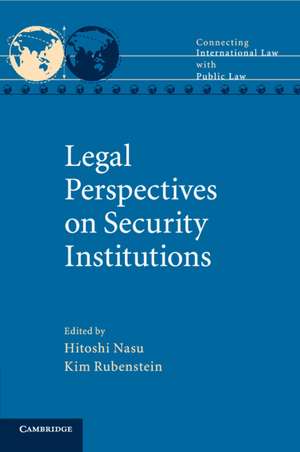Legal Perspectives on Security Institutions: Connecting International Law with Public Law
Editat de Hitoshi Nasu, Kim Rubensteinen Limba Engleză Paperback – 12 dec 2018
| Toate formatele și edițiile | Preț | Express |
|---|---|---|
| Paperback (1) | 324.62 lei 6-8 săpt. | |
| Cambridge University Press – 12 dec 2018 | 324.62 lei 6-8 săpt. | |
| Hardback (1) | 787.12 lei 6-8 săpt. | |
| Cambridge University Press – 23 iul 2015 | 787.12 lei 6-8 săpt. |
Preț: 324.62 lei
Nou
Puncte Express: 487
Preț estimativ în valută:
62.12€ • 67.68$ • 52.34£
62.12€ • 67.68$ • 52.34£
Carte tipărită la comandă
Livrare economică 23 aprilie-07 mai
Preluare comenzi: 021 569.72.76
Specificații
ISBN-13: 9781107501072
ISBN-10: 1107501075
Pagini: 437
Ilustrații: 1 b/w illus.
Dimensiuni: 150 x 227 x 23 mm
Greutate: 0.58 kg
Editura: Cambridge University Press
Colecția Cambridge University Press
Seria Connecting International Law with Public Law
Locul publicării:New York, United States
ISBN-10: 1107501075
Pagini: 437
Ilustrații: 1 b/w illus.
Dimensiuni: 150 x 227 x 23 mm
Greutate: 0.58 kg
Editura: Cambridge University Press
Colecția Cambridge University Press
Seria Connecting International Law with Public Law
Locul publicării:New York, United States
Cuprins
Introduction: the expanded conception of security and institutions Hitoshi Nasu and Kim Rubenstein; Part I. Security and Institutional Evolution: 1. Conscious and unconscious security responses Alexandra Walker; 2. 'You cannot hold two watermelons in one hand': gender justice and anti-state local security institutions in Pakistan and Afghanistan Bina D'Costa; 3. Institutional competence and the Common Foreign and Security Policy of the European Union Anne McNaughton; 4. Building international maritime security institutions: public and private initiatives Chie Kojima; Part II. Security Institutions and the Rule of Law: 5. General principles of law and a source-based approach to the regulation of international security institutions Imogen Saunders; 6. The United Nations Security Council's legislative phase and the rise of emergency international law-making Anna Hood; 7. Institutional evolution in Africa and the 'peacekeeping institution' Hitoshi Nasu; 8. Security and the law in international and domestic institutions: lessons from Israel's border security Solon Solomon; Part III. Security Institutions and Legitimacy: 9. The evolution of the nuclear non-proliferation regime: the International Atomic Energy Agency and its legitimacy Kalman A. Robertson; 10. The World Health Organization, global health security, and international law Adam Kamradt-Scott; 11. The institutionalisation of dispute settlements in Southeast Asia: the legitimacy of the Association of Southeast Asian Nations in de-securitising trade and territorial disputes See Seng Tan; Part IV. Security Institutions and Regime Collision: 12. The Food and Agricultural Organization and food security in the context of international intellectual property rights protection Dilan Thampapillai; 13. Rice is life: regional food security, trade rules and the ASEAN Plus Three Emergency Rice Reserve Michael Ewing-Chow, Melanie Vilarasau-Slade and Liu Gehuan; 14. Legal challenges to cyber security institutions Ottavio Quirico; 15. Concluding remarks Thomas Pogge.
Descriere
Explores the tensions that arise when institutions address contemporary security threats.






















